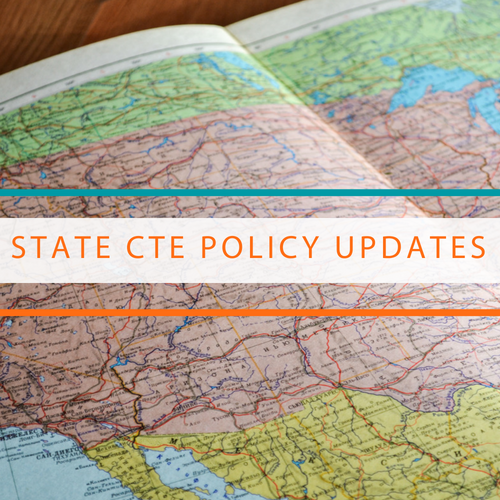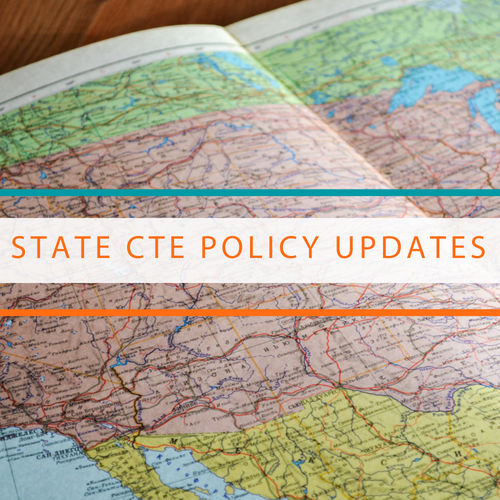 Advance CTE joins the Arkansas Department of Education in welcoming Ross White as the new State Career Technical Education (CTE) Director. Ross transitions into this role while fulfilling the duties of the Association for Career and Technical Education (ACTE)’s Region IV Vice President.
Advance CTE joins the Arkansas Department of Education in welcoming Ross White as the new State Career Technical Education (CTE) Director. Ross transitions into this role while fulfilling the duties of the Association for Career and Technical Education (ACTE)’s Region IV Vice President.
Advance CTE staff met with Ross as he shared his pathway to becoming the State CTE Director, as well as his initial priorities for CTE in Arkansas.
Advance CTE: Which of your professional experiences has most prepared you for your role as the State Director?
Ross: Most of my time in education has been spent in the CTE setting: a classroom educator, career student technical organization (CTSO) advisor, district CTE director, and as an ACTE officer and member. I give credit to my years as the district director because it is in this role where I learned how to be innovative and bold, rethinking systemic solutions to serve each learner. I also developed strong business and industry partnerships that I can continue to foster as State Director.
Advance CTE: In what ways have you had the opportunity to leverage social capital and professional networks in your career progression?
Ross: Early in my professional career journey, I had a mentor who taught me all I needed to know about CTE. I have relied immensely on this knowledge throughout my career, and will do so as I became the State Director. I also participated in the ACTE’s National Fellowship and have been active in multiple professional memberships. In my experience, no matter the type of fellowship (or mentorship), there will be an amount of influence, conversation and ability to impact change. Ultimately, social capital is not the people you know, but the people who make you grow.
Advance CTE: What excites you most about being the State Director in Arkansas?
Ross: It excites me that in this new role as State Director I will be able to more quickly connect policy and programming across the CTE ecosystem in the state. This is largely due to my background in school administration, in the classroom and at the state agency. However, also playing a part is the consolidation of all education programs under the Department of Education. Being under one “roof”, the state CTE system will become much stronger in our cross-sector relationships, aligning secondary and postsecondary systems, and will have the opportunity for more frequent communication and data sharing.
Advance CTE: As you are settling into your new position, what initial priorities have you identified?
Ross: I have identified a few initial priorities around CTE data collection and reporting. One of our Strengthening Career and Technical Education for the 21st Century Act (Perkins V) program quality indicators is credentials of value. Yet, we do not have a best practice in place to meet the data reporting needs for credentials in our state. Once we identify the best path forward from the state-level, the next priority will be to educate local districts on credentialing and credential data.
The work we have to do around credentialing aligns with our career coach initiative in the state. We have received additional funding to implement career coaches and it is a priority to scale statewide.
Advance CTE: Fast forward and we are now celebrating your one-year anniversary as State Director. What is one challenge you’d like to have overcome by that milestone?
Ross: We have a need for the division of career and technical education (DCTE) to reinvent our brand in the state. We are known far too often as, “the rules place.” I want to build more trusting and lasting relationships with our local recipients, ensuring they know who to call on my state team when they are in need of support. I hope to have been successful in this endeavor by this time next year.
Our state team will also work to address teacher shortages across the state. I am sitting in on a working group that is developing a grow your own program. Over the next year, I hope to be able to celebrate its success.
Advance CTE: What is one weekend activity or hobby or interest you would like your peers to know about you?
Ross: Outside of work, my wife and I spend much time attending to our daughters and their love for dancing, swimming and gymnastics.
Welcome, Ross! Advance CTE is thrilled to support Ross as he strives to ensure each learner in Arkansas has access to and the means to succeed in any high-quality CTE program or experience that leads to success in their career of choice.
Click here to learn more about the state CTE system in Arkansas.
View resources that feature best practices in Arkansas here.
Follow Ross on Twitter
Brittany Cannady, Senior Associate for Digital Media


 State education agencies, legislators and educators faced significant challenges from
State education agencies, legislators and educators faced significant challenges from  State education agencies, legislators and educators faced significant challenges from
State education agencies, legislators and educators faced significant challenges from  Now that we are nearing the end of the first two-years of the CLNA and as states begin to ramp up their second process, Advance CTE and the Association for Career and Technical Education (ACTE) interviewed state and local Career Technical Education (CTE) leaders to identify exemplar states and their journey through implementation.
Now that we are nearing the end of the first two-years of the CLNA and as states begin to ramp up their second process, Advance CTE and the Association for Career and Technical Education (ACTE) interviewed state and local Career Technical Education (CTE) leaders to identify exemplar states and their journey through implementation. 
 Chairman Todd Rokita (R-IN) in his
Chairman Todd Rokita (R-IN) in his 
